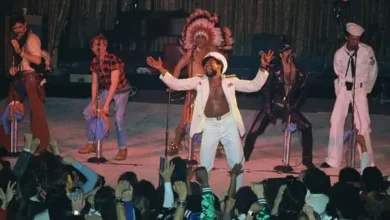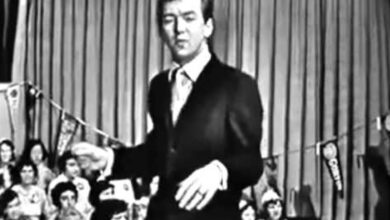Lulu & The Luvvers’ “Shout” – The Electrifying Debut That Introduced a Soulful Powerhouse in 1964
When “Shout” was released in 1964, it marked the explosive arrival of a teenage sensation named Lulu. Backed by her band, The Luvvers, the Scottish-born singer took an already well-known Isley Brothers classic and infused it with a raw, youthful energy that set her apart from her British contemporaries. At just 15 years old, Lulu delivered a powerhouse performance that showcased her deep, soulful voice, making it clear that she was no ordinary pop singer. The song became a defining moment in her career, reaching No. 7 on the UK Singles Chart and positioning her as one of the most dynamic voices of the British music scene.
Born Marie McDonald McLaughlin Lawrie in Glasgow, Scotland, in 1948, Lulu was drawn to music from a young age. Her natural talent and big voice—one that belied her petite stature—caught the attention of talent scouts when she was still a teenager. She was signed to Decca Records and paired with The Luvvers, a Glasgow-based backing band that helped bring a rock and R&B edge to her sound. Unlike many of the polished pop singers emerging in the UK during the early 1960s, Lulu had a grit and power to her voice that made her more comparable to American soul singers than to the beat groups of the British Invasion.
The original version of “Shout” had been recorded by The Isley Brothers in 1959. Though it wasn’t initially a chart-topping hit, the song had become a staple of dance halls and party playlists, particularly in the United States. Its call-and-response structure, infectious energy, and gospel-inspired roots made it a song that encouraged audience participation, something that would later define Lulu’s stage presence. When her management and record label were looking for a song that could introduce her to the world with maximum impact, “Shout” was a natural choice.
Lulu’s version of “Shout” was recorded at Decca Studios in London with a production that emphasized raw, live energy rather than studio perfection. The track featured a driving rhythm section, punchy brass accents, and The Luvvers’ tight instrumentation, but it was Lulu’s voice that dominated. Her ability to transition from controlled, sultry verses to full-throttle, uninhibited wails set the song ablaze. At just 15, she delivered the song with a confidence and command that made it feel as though she had been performing for decades. The result was a record that captured the pure excitement of early rock and soul music.
Upon its release, “Shout” was met with enthusiastic reception. It climbed the UK charts, peaking at No. 7, an impressive feat for a debut single by a young Scottish artist. While it didn’t make an immediate impact in the U.S., it established Lulu as a force to be reckoned with in Britain. The song became a staple of her live performances, where she often extended it into a show-stopping number filled with audience participation. In an era dominated by polished pop and beat music, “Shout” stood out for its sheer, unfiltered energy.
More than just a hit single, “Shout” helped redefine what was possible for female artists in the UK music industry. While many young British female singers of the time were expected to conform to a more reserved, polished image, Lulu’s fearless performance style broke the mold. Her vocal power was often compared to that of American soul singers like Tina Turner and Aretha Franklin, and her dynamic stage presence helped pave the way for future female rock and soul vocalists in the UK.
For Lulu, the success of “Shout” was just the beginning of a long and varied career. She quickly became one of Britain’s most beloved entertainers, transitioning from pop stardom to television, film, and musical theater. Unlike many of her peers who faded after their initial hits, she remained a relevant figure in British entertainment for decades. Though she would later achieve greater commercial success with songs like “To Sir, With Love” and “Boom Bang-a-Bang” (which won the 1969 Eurovision Song Contest), “Shout” remained the song that introduced her as a formidable vocal talent.
The song’s influence extended beyond Lulu herself. Over the years, “Shout” has been covered by countless artists across multiple genres. Its status as a high-energy anthem has made it a favorite for live performances, party playlists, and sporting events. In particular, Lulu’s version became a staple of British pop culture, ensuring that her rendition was as recognizable as the original Isley Brothers version.
At the time of its release, “Shout” arrived during a pivotal moment in the British music scene. The British Invasion was in full swing, with bands like The Beatles and The Rolling Stones taking over the airwaves. While much of the focus was on male-dominated groups, Lulu’s “Shout” proved that a young female singer could command just as much attention. It also helped bridge the gap between the UK’s pop scene and the American R&B and soul influences that were beginning to shape global music trends.
More than 50 years later, “Shout” remains a defining moment in Lulu’s career and a landmark recording in British rock and soul history. It has been performed countless times on television, at major events, and during Lulu’s own live shows, often serving as the climactic moment of her sets. The song’s legacy is not just in its chart success but in its lasting impact on how female vocalists approached performance and energy in popular music.
The track also played a role in setting the stage for future British female artists who embraced a more powerful, soulful vocal style. Without the precedent set by “Shout”, artists like Dusty Springfield, Amy Winehouse, and even contemporary performers like Jessie J might not have had the same foundation upon which



